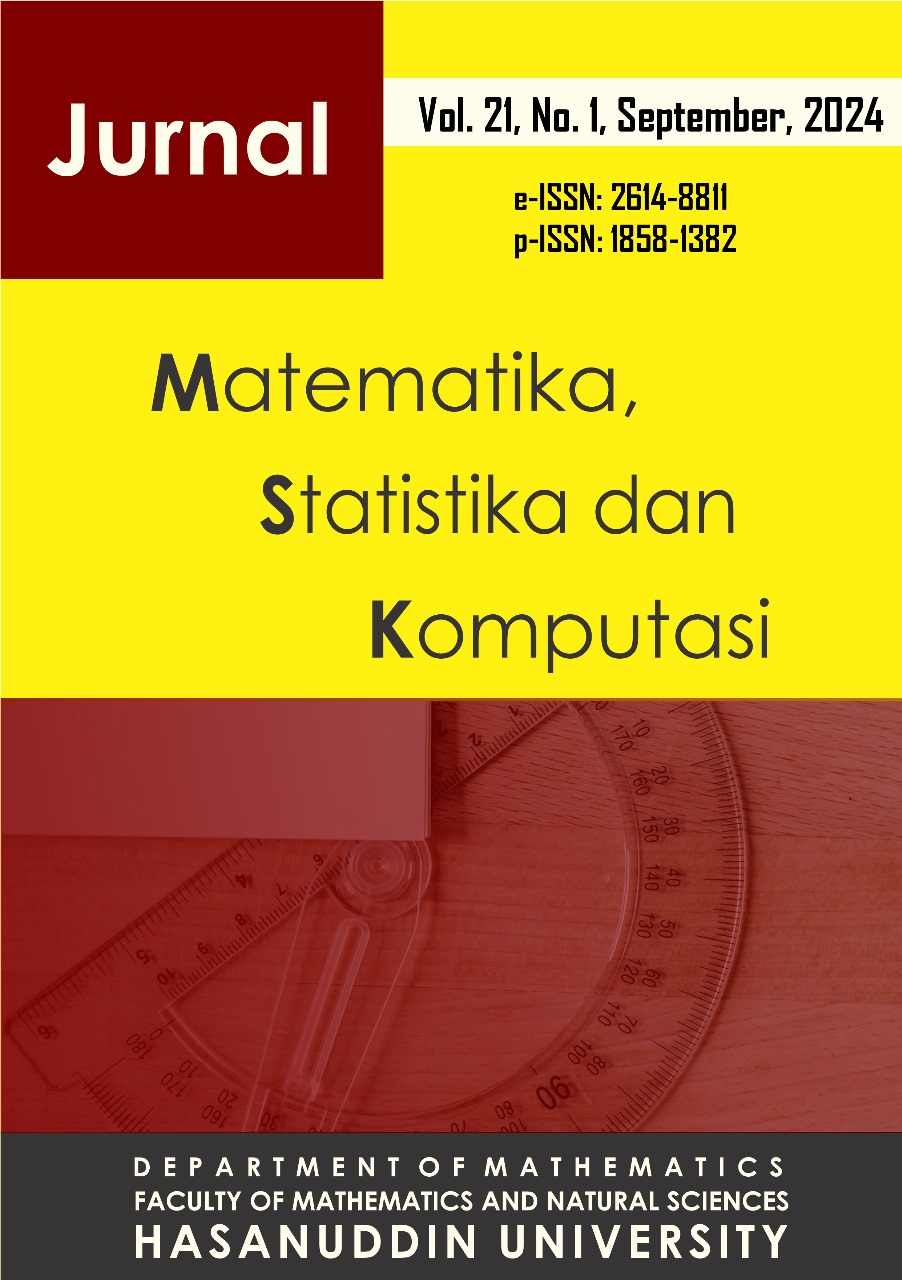Covid-19 Vaccination Impact on Four Asean Countries’ Stock With Spatial Dependency: A Comparison of Panel and Geographically Weighted Regression
DOI:
https://doi.org/10.20956/j.v21i1.36177Keywords:
GWR Panel, Regression Panel, Vaccination, Stock ReturnsAbstract
Research about various policies and responses toward COVID-19 cases and its impact on stocks has grown recently. It shows that spatial influence is one of the keys in this research. The pandemic is not free from spatial dependence regarding how it indirectly impacts a country’s economy. Each country has different policies to handle COVID-19, such as lockdowns and vaccination. WHO stated that all countries require vaccination to build human immunity against COVID-19 in the future. Naturally, ASEAN implemented this policy; thus, it is crucial to see the extent of the impact of vaccination on the ASEAN economy. However, the residuals have heterogeneity problems when using the panel regression model. One of the reasons is that there is spatial dependence, especially when modeling the COVID-19 pandemic. Therefore, comparing panel regression with a geographically weighted regression panel (GWR-Panel) is substantial when exploring the reaction of stock returns to vaccination and positive cases of COVID-19 in Indonesia, Malaysia, Singapore, and Thailand
References
Agustina, M., Rochmat, T., Muliani, D. A., Zikran, G., Dinda, L., & Seftarita, C., 2021. How ASEAN Nations Responded to the Economic Shocks through Monetary Policy. 2021 International Conference on Decision Aid Sciences and Application, DASA 2021, 122–126. https://doi.org/10.1109/DASA53625.2021.9682293
Anastasiou, D., Ballis, A., & Drakos, K., 2022. Constructing a positive sentiment index for COVID-19: Evidence from G20 stock markets. International Review of Financial Analysis, 81(March), 102111. https://doi.org/10.1016/j.irfa.2022.102111
Beenstock, M., & Felsenstein, D., 2019. Advances in Spatial Science The Econometric Analysis of Non-Stationary Spatial Panel Data. Springer Nature Switzerland.
Behera, C., & Rath, B. N., 2023. The Interconnectedness between COVID-19 Uncertainty and Stock Market Returns in Selected ASEAN Countries. Emerging Markets Finance and Trade, 59(2), 515–527. https://doi.org/10.1080/1540496X.2022.2096434
Brunsdon, C., Fotheringham, S., & Charlton, M., 1998. Geographically weighted regression - modelling spatial non-stationarity. The Statistician, 47, 431–443. https://doi.org/https://doi.org/10.1111/1467-9884.00145
Chan, K. F., Chen, Z., Wen, Y., & Xu, T., 2022. COVID-19 vaccines and global stock markets. Finance Research Letters, 47(PB), 102774. https://doi.org/10.1016/j.frl.2022.102774
Eachempati, P., Srivastava, P. R., & Panigrahi, P. K., 2021. Sentiment analysis of COVID-19 pandemic on the stock market. American Business Review, 24(1), 141–165. https://doi.org/10.37625/abr.24.1.141-165
Fotheringham, A. S., Brunsdon, C., & Charlton, M., 2002. Geographically WeightedRegression: the analysis of spatially varying relationships. John Wiley & Sons Ltd.
Greene, W. H. (2018). Econometric Analysis (8th ed.). Pearson Education Limited.
Herlina, M., Mafruhat, A. Y., Kurniati, E., Wildan, W., & Salsabila, H. G., 2022. The stock market reaction to COVID-19 vaccination in ASEAN. F1000Research, 11(May), 363. https://doi.org/10.12688/f1000research.110341.1
Hsu, Y. L., & Tang, L., 2022. Effects of investor sentiment and country governance on unexpected conditional volatility during the COVID-19 pandemic: Evidence from global stock markets. International Review of Financial Analysis, 82(September 2021), 102186. https://doi.org/10.1016/j.irfa.2022.102186
Huong, L. T. M., 2024. The contagion between stock markets: evidence from Vietnam and Asian emerging stocks in the context of COVID-19 Pandemic. Macroeconomics and Finance in Emerging Market Economies, 17(1), 78–94. https://doi.org/10.1080/17520843.2021.1993653
Liu, H., Manzoor, A., Wang, C., Zhang, L., & Manzoor, Z., 2020. The COVID-19 outbreak and affected countries stock markets response. International Journal of Environmental Research and Public Health, 17(8), 1–19. https://doi.org/10.3390/ijerph17082800
Reis, P. M. N., 2022. Determinants of Qualified Investor Sentiment during the COVID-19 Pandemic in North America, Asia and Europe. Economies, 10(6). https://doi.org/10.3390/economies10060143
The Ministry of Health, NITAG, UNICEF, & WHO., 2020. COVID-19 Vaccine Acceptance Survey in Indonesia. In Kementerian Kesehatan Republik Indonesia (Vol. 1, Issue November).
To, B. C. N., Nguyen, B. K. Q., & Nguyen, T. V. T., 2023. When the market got the first dose: Stock volatility and vaccination campaign in COVID-19 period. Heliyon, 9(1), e12809. https://doi.org/10.1016/j.heliyon.2023.e12809
UNAL, S., ÇÖMLEKÇİ, İ., & ÖZER, A., 2022. Stock Market Reaction to Covid-19 Vaccination Rate: International Study. Konuralp Tıp Dergisi, 14(S1), 183–191. https://doi.org/10.18521/ktd.1022009
Wooldridge, J. M., 2002. Econometric Analysis of Cross Section and Panel Data. The MIT Press. https://doi.org/10.1515/humr.2003.021
Yiu, M. S., & Tsang, A., 2023. Impact of COVID-19 on ASEAN5 stock markets. Journal of the Asia Pacific Economy, 28(4), 1392–1405. https://doi.org/10.1080/13547860.2021.1947550
Zaremba, A., Kizys, R., Tzouvanas, P., Aharon, D. Y., & Demir, E, 2021. The quest for multidimensional financial immunity to the COVID-19 pandemic: Evidence from international stock markets. Journal of International Financial Markets, Institutions and Money, 71, 101284. https://doi.org/10.1016/j.intfin.2021.101284
Downloads
Published
How to Cite
Issue
Section
License
Copyright (c) 2024 Jurnal Matematika, Statistika dan Komputasi

This work is licensed under a Creative Commons Attribution 4.0 International License.

This work is licensed under a Creative Commons Attribution 4.0 International License.
Jurnal Matematika, Statistika dan Komputasi is an Open Access journal, all articles are distributed under the terms of the Creative Commons Attribution License, allowing third parties to copy and redistribute the material in any medium or format, transform, and build upon the material, provided the original work is properly cited and states its license. This license allows authors and readers to use all articles, data sets, graphics and appendices in data mining applications, search engines, web sites, blogs and other platforms by providing appropriate reference.







